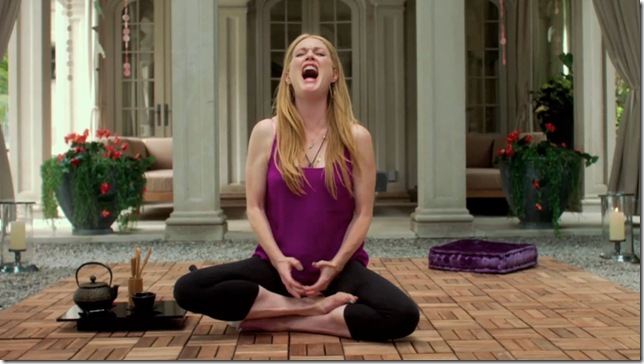It was just Sunday that Julianne Moore won a much-deserved Oscar for beautifully, elegantly portraying a woman navigating the slippery, debilitating reality of early-onset Alzheimer’s.
Now, she’s back in theaters again in David Cronenberg’s blunt-force satire Maps to the Stars, where the tone is a wee bit different: We witness her making a putrid bowel movement, engaging in a pathetic threesome, seducing a chauffeur for purely vindictive purposes, and dancing on the veritable grave of a child, in whose death she discovers a career opportunity.
Her character, Havana Segrand, is the daughter of an abusive 1970s silver screen starlet who perished in her prime. Clearly damaged inside, Havana desperately piles on makeup in an unsuccessful attempt to look 20 years younger, making for a pitiful archetype of washed-up Hollywood. At the risk of sounding all “Roger Ebert-Blue Velvet-avenger of the mistreated actress,” suffice it to say that Julianne Moore is more than just an unpretty vision in Maps to the Stars.
She’s a degraded object who, like the movie that envelops her, adds little to our already ingrained conception of Hollywood as a wasteland of entitlement, vice, vanity and immorality. With all eyes on Moore’s Oscar-winning master class in Still Alice, her thinly conceived train wreck in Maps to the Stars is a cruel repercussion of release-date caprice.
Then again, nobody in Bruce Wagner’s savage screenplay gets off easy. Havana’s new personal assistant, Agatha (Mia Wasikowska), is a pyromaniac fresh out of a care center in Florida (Jupiter, to be precise!) who is determined to reconnect with the family whose lives she upended when she burned down their house at the age of 7. Her brother, Benjie (Evan Bird), is a pampered and dysfunctional teen heartthrob in the Justin Bieber mode, whose latest comedy vehicle threatens to derail if his summer of substance abuse leaks to the tabloids.
Benjie is managed by his controlling mother (Olivia Williams). His father (John Cusack), meanwhile, is a self-help guru/pop psychologist/massage therapist to the stars, whose clients include Havana — just in case the film’s Agatha/Havana connection wasn’t enough to circumstantially link these characters. Apparently, this city of 3.8 million is an awfully small world.
Themes of sacrifice by fire and water accumulate as characters become haunted by apparitions that channel their guilt and shame, while the genetics of mental illness swim in a sea of privileged sociopathy. The story spirals toward converging bloodbaths befitting Cronenberg’s penchant for shocking violence in affluent milieus, though directorial flair cannot compensate for a narrative anchored by simple, obvious ironies.
Wagner uses his characters as mouthpieces to assail Hollywood’s bulldozing avarice, its staggering superficiality and its self-serving populace, while taking specific aim at the region’s obsessions with Tibet and faux spirituality. Cutting at times and acridly funny in small doses, Maps to the Stars essentially kicks a victim that’s already down, having been long pummeled into submission by films ranging from The Bad and the Beautiful to Sunset Blvd. to The Player to The Canyons to Birdman, not to mention the innumerable myopic indies inspired by autobiographical movie-industry miseries.
You don’t have to be a raging right-wing hate-talker to see Hollywood as a soulless Sodom that will be the first metropolitan playground to be decimated when the rapture comes. Cronenberg fans have long awaited his first film shot entirely in the United States; who would have thought it would be a tired, two-hour harangue against the business that has made him a multimillionaire?
MAPS TO THE STARS. Director: David Cronenberg; Cast: Julianne Moore, Evan Bird, Mia Wasikowska, John Cusack, Olivia Williams, Robert Pattinson, Sarah Gadon; Distributor: Focus; Rating: R; Opens: Friday at Cinema Paradiso in Fort Lauderdale
